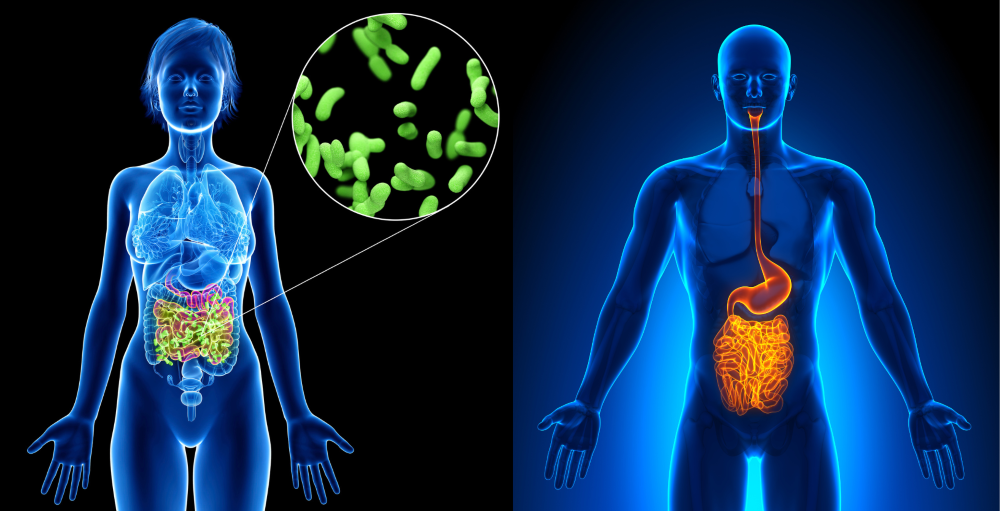What Does Gut Health Mean?
Did you know that your gut is home to hundreds of different species of bacteria and other microorganisms? Collectively these microorganisms are known as the gut microbiome. The gut microbiome plays a very important role in our health and wellbeing.
Why Does Gut Health Matter?
A balanced gut microbiome contributes positively to your wellbeing. On the flipside, an unbalanced microbiome can lead to poor health and undesirable symptoms.
You might be wondering how an imbalance in your digestive tract can have such an impact on your entire body. The gut is a much more sophisticated organ than people used to believe. Did you know that the gut has its own nervous system? This is called the enteric nervous system and connects the gut directly to the main nervous system in the brain. This connection is known as the gut-brain axis, and explains why problems in our gut can lead to problems elsewhere in the body.
What Problems Can Poor Gut Health Lead To?
Poorer Wellbeing
Changes in the gut microbiome can lead to a range of negative effects on wellbeing including poorer quality of sleep,1 weight gain1 or low energy.2
Mental Health Problems
Imbalances in the microbiome of the gut have been linked to several mental illnesses including anxiety and depression.3
Physical Health Problems
Evidence suggests the balance of gut microbiome affects how susceptible we are to certain diseases including:4
- Diseases of the intestinal tract. For example, ulcerative colitis, Crohn’s disease, celiac disease and irritable bowel syndrome (IBS).
- Diseases that affect the body on a more systemic level. For example obesity and diabetes (types 1 and 2)
Signs Your Gut Health May Need Attention
If you’re experiencing the following symptoms, a gut health assessment may help you identify and manage the cause of your symptoms:
- Bloating
- Changeable bowel habit
- Excessive wind
- Abdominal pain or discomfort
- Recurrent indigestion
Some people may also choose to attend a bowel assessment to help with more generalised symptoms that may be caused by their gut health:
- Feeling tired all the time
- Unintentional weight loss or gain
- Mood problems such as anxiety or depression
How Can You Fix Your Gut Health?
There are a variety of steps you can take to improve your gut health. We recommend speaking to a gut health specialist to find out the best options for you.
One approach your gut health specialist may recommend is an elimination diet.
Elimination Diets
Elimination diets involve removing specific foods from the diet to assess whether their absence improves your wellbeing.
Benefits of Elimination Diets
Elimination diets have many benefits. They can:
- Identify your food intolerances
- Help you learn what foods work best with your own personal microbiome
- Reduce symptoms of conditions related to gut health (such as autoimmune conditions)
How Do You Do an Elimination Diet?
Elimination diets are best done with medical guidance. Your doctor can help you get the best results without compromising your nutrition.
Elimination diets can take one of two approaches:
- Complete elimination – completely removing food groups from the diet. Used when your doctor thinks you are experiencing an immune reaction to a certain substance.
- Restriction/reduction – reducing the intake of certain food groups. Used when your doctor thinks that reducing the amount of a certain substance will help reduce or manage symptoms e.g. the FODMAP diet
What Diets Are Recommended For IBS?
If you have Irritable Bowel Syndrome your doctor may recommend an elimination diet. Commonly recommended elimination diets for IBS include:
FODMAP Diet
The FODMAP diet reduces certain food groups that your gut may struggle to properly digest. For example certain types of fruit and vegetables, milk, and wheat products.
Gluten-Free Diet
The Gluten-free diet involves avoiding foods that contain gluten. This means cutting out food products that contain certain grains such as wheat and barley.
Traditional Dietary Advice (TDA)
TDA is less of a diet and more of a general set of sensible rules for you to follow. Traditional dietary advice will involve guidance on keeping meal times regular, limiting fat intake and other suggestions.
How to get help for your gut health
At ROC Clinic, we believe that gut health is at the core of many illnesses. We offer gut health assessments and personalised management plans to help our patients optimise their gut health. We believe that optimised gut health leads to improved wellbeing.
To find out more about our gut health assessments click here. To book, give our friendly reception team a call on 01224 515254.
References
- Zhang YJ, Li S, Gan RY, Zhou T, Xu DP, Li HB. Impacts of gut bacteria on human health and diseases. Int J Mol Sci. 2015;16(4):7493-7519. Published 2015 Apr 2. doi:10.3390/ijms16047493
https://www.ncbi.nlm.nih.gov/pmc/articles/PMC4425030/
- Lakhan SE, Kirchgessner A. Gut inflammation in chronic fatigue syndrome. Nutr Metab (Lond). 2010;7:79. Published 2010 Oct 12. doi:10.1186/1743-7075-7-79
https://pubmed.ncbi.nlm.nih.gov/20939923/
- Clapp M, Aurora N, Herrera L, Bhatia M, Wilen E, Wakefield S. Gut microbiota’s effect on mental health: The gut-brain axis. Clin Pract. 2017;7(4):987. Published 2017 Sep 15. doi:10.4081/cp.2017.987
- Brown K, DeCoffe D, Molcan E, Gibson DL. Diet-induced dysbiosis of the intestinal microbiota and the effects on immunity and disease [published correction appears in Nutrients. 2012 Oct;4(11)1552-3]. Nutrients. 2012;4(8):1095-1119. doi:10.3390/nu4081095



2 Responses
Excellent post, Good to be here, thanks for sharing this helpful stuff. The information was great. I was suffering from gut health issues when I heard about colon hydrotherapy and gathered information from different resources. I would love to read an article on gut health by you. Keep sharing.
Thank you for your comment!